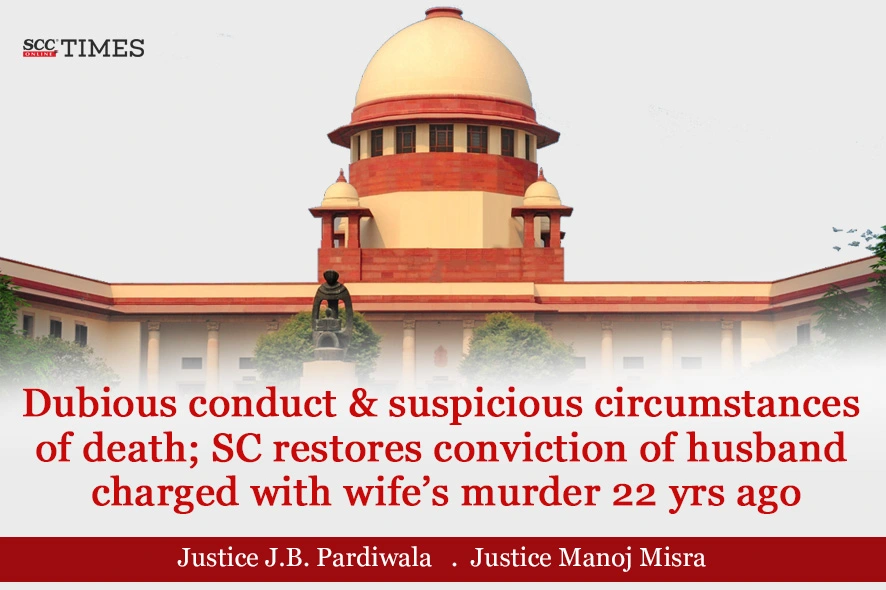Supreme Court: While considering the instant appeal challenging the accused husband’s acquittal in the case concerning his wife’s death under mysterious circumstances 22 years ago (2003); the Division Bench of J.B. Pardiwala* and Manoj Misra, JJ., upon perusing the facts of the case, found that the circumstances in the case constitute more than a prima facie case to enable the prosecution to invoke Section 106 of the Evidence Act and shift the burden on the accused husband to explain what had happened on the day & date his wife died. The Court opined that the prosecution duly established the foundational facts, thereby justifying the invocation of Section 106, Evidence Act. The Court while determining the matter, reiterated the foundational principles regarding testimony of a child witness and convictions based on circumstantial evidence. Hence, the accused husband’s acquittal was set aside and his conviction and sentence by the Trial Court was restored.
The Court pointed out that if an offence takes place inside the four walls of a house and in such circumstances where the accused has all the opportunity to plan and commit the offence at the time and in the circumstances of its choice, it will be extremely difficult for the prosecution to lead direct evidence to establish the guilt of the accused. It is to resolve such a situation that Section 106 of the Evidence Act exists in the statute book.
Background:
On the night of 15-7-2003, the complainant along with his father and relatives heard cries and screams of the deceased coming from the house of the accused. After some time, the screams of the deceased stopped. At about in the morning, they learnt from the other inhabitants of the village that the deceased had died during the night and that her body had been cremated.
After the matter was investigated, a chargesheet was filed against the accused husband and his sister for commission of offences under Sections 302, 201 read with Section 34 of the IPC.
The Trial Court upon perusal of the evidence, circumstances and witnesses (including a child witness), found the accused husband guilty, convicting and sentencing him to undergo rigorous imprisonment for life with fine of Rs. 1,000 for the offence punishable under Section 302 IPC and four years of rigorous imprisonment along with fine of Rs. 2,000 for the offence punishable under Section 201 of the IPC.
Aggrieved with the afore-stated decision of the Trial Court, the accused appealed before Madhya Pradesh High Court. The High Court via the impugned judgment of 2010, acquitted the accused and set aside the Trial Court’s order of conviction finding that the testimony of the child witness, (PW6), was unreliable and tutored.
Court’s Assessment:
Upon perusing the case, facts and evidence of the prosecution and reasoning of the High Court in acquitting the accused husband, the Court deemed it fit to examine the principles on appreciation of testimony made by a child witness, circumstantial evidence and applicability of Section 106 of the Evidence Act and found that the offence in the instant case took place inside the four walls of the house in which the accused, the deceased and their 7-year-old daughter (PW6) were living. The accused has not disputed his presence in the house at the time of the alleged incident. Furthermore, the accused failed to inform the family members about the death of their daughter and the clandestine manner in which her body was cremated, more particularly when her family members were residing in the very same village. The Court took note of the accused’s dubious conduct in fleeing away from home leaving behind his minor daughter of seven years age all alone; deceased untimely death after a marital dispute and failure of the accused to explain incriminating circumstances.
The Court observed that cases are frequently coming before the Courts where the husbands, due to strained marital relations and doubt as regards the character, have gone to the extent of killing the wife. These crimes are generally committed in complete secrecy inside the house and it becomes very difficult for the prosecution to lead evidence. “No member of the family like in the case on board, even if he is a witness of the crime, would come forward to depose against another family member”. It was further observed that the role of courts in such circumstances assumes greater importance and it is expected of the courts to deal with like one on hand, cases in a more realistic manner and not allow the criminals to go scot-free on account of procedural technicalities, perfunctory investigation or insignificant lacunas in the evidence as otherwise serious crimes would go unpunished. The courts are expected to be sensitive in cases involving crime against women.
Hence the Court found the instant case to be fit for the prosecution to invoke Section 106 of the Evidence Act and set aside the accused husband’s acquittal and directed the accused to surrender before the Trial Court within a period of four weeks from 24-2-2025 to undergo the sentence as imposed by the Trial Court.
Also Read:
CASE DETAILS
|
Citation: Appellants : Respondents : |
Advocates who appeared in this case For Petitioner(s): For Respondent(s): |
CORAM :









